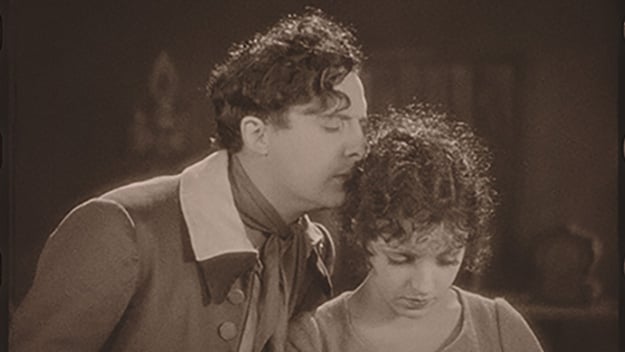The Best Restorations of 2024
This article is part of Film Comment’s Best of 2024 coverage. Read all the lists here.
At a recent panel at Anthology Film Archives about new scans and restorations of the films of Sergei Parajanov, preservationist Daniel Bird spoke insightfully about how film restoration is always a work in progress—how there is no definitive version of a film as long as materials continue to be found and technology continues to change. And it’s not just about the materials: there is also the fact that it’s humans who make key decisions about restorations, and those decisions may differ across individuals, institutions, and time.
With that in mind, I have selected 10 restorations and reprints that represent some of the best work done this year. That work encompasses efforts to make difficult-to-see films available to the public, engagement with cinema history, and varied technical outcomes. In making my selection, I also prioritized projects that struck new screening prints. While there is much to be thankful for whenever a film is made accessible due to digital scanning and restoration, I fear we are losing something extremely important when we don’t return the movie to its original material of production and projection.
Complete technical credits, the labor involved in these restorations, and more information about each film can be found via the link in the film title.
The Fall of Otrar (Ardak Amirkulov, 1991, Kazakhstan/USSR)

The new 4K restoration of Ardak Amirkulov’s intricate historical epic, co-written by the great Aleksei German, was completed by The Film Foundation’s World Cinema Project and Cineteca di Bologna at L’Immagine Ritrovata laboratory, in collaboration with Amirkulov—a move that will hopefully help this monumental film to reach as many people as possible.
Scarecrow in a Garden of Cucumbers (Robert J. Kaplan, 1972, U.S.)

A new 35mm print of Robert J. Kaplan’s glorious musical satire and Holly Woodlawn lovefest was struck by the Academy Film Archive. This rescue effort followed the film’s near-consignment to oblivion when DuArt, the studio housing Scarecrow’s negative, began closing its storage facilities in 2013.
Bitter Cane (Ben Dupuy & Kim Ives [as Jacques Arcelin], 1983, Haiti)

Filmed secretly in Haiti by a collective of Haitian and American filmmakers, this vital and gripping documentary was restored in 4K by IndieCollect.
The Red Mark (James Cruze, 1928, U.S.)

James Cruze’s gorgeously photographed silent melodrama was restored by the Library of Congress and the San Francisco Silent Film Festival. The resultant 35mm print was chemically dye-tinted.
The Sealed Soil (Marva Nabili, 1977, Iran)

Marva Nabili’s minimalist masterpiece—the earliest surviving feature film directed by a woman in Iran—was digitally restored using the 16mm original A/B negatives by the UCLA Film & Television Archive.
Samba Traoré (Idrissa Ouédraogo, 1992, Burkina Faso/France/Switzerland)

The 4K restoration of Idrissa Ouédraogo’s taut study of guilt, made in Burkina Faso, was completed as part of the Locarno Heritage Online program by Cinegrell Postproduction GmbH. I hope someone will facilitate a comprehensive retrospective of Ouédraogo’s incredible films very soon.
Nightshift (Robina Rose, 1981, U.K.)

Robina Rose’s beguiling 16mm nocturne—the true discovery of this year’s New York Film Festival—was restored in 4K by Lightbox Film Center at the University of the Arts (Philadelphia) in collaboration with the British Film Institute and Cinenova.
North by Northwest (Alfred Hitchcock, 1959, U.S.)

Alfred Hitchcock’s endlessly entertaining thriller was filmed in VistaVision and released in 1.85. For this new restoration—done in collaboration with The Film Foundation—Warner Bros. scanned the original 8-perf 35mm VistaVision camera negative in 13K at Motion Picture Imaging laboratory. New 70mm prints were created for screenings that have taken place all around the world.
Dirty Money (Denys Arcand, 1972, Canada)

The closest thing I’ve seen to a perfect film in quite some time, Denys Arcand’s thriller was newly scanned and restored in 4K from the 35mm original camera negative by Éléphant – mémoire du cinéma québécois. It screened in New York City as part of a series entitled “Quebec-Core,” dedicated to French-Canadian New Wave cinema, where every selection was a stunning revelation.
Man Trouble (Berthold Viertel, 1930, U.S.)

Berthold Viertel’s pre-Code rarity survived only as a 35mm nitrate work print after the loss of preprint material in the Fox vault fire in 1937, and has been virtually unavailable to viewers until now. The new restoration was done by the UCLA Film & Television Archive and outputted to 35mm.
Gina Telaroli is a filmmaker and cinema worker.







